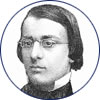Charles Ives
1874–1954 B.A. 1898
|

|
Charles Ives probably ranks with George Gershwin as one of the first great American composers. They were also the first to bring distinctive national idioms into the concert hall. Ives stands apart for his combination of thematic Americana with truly innovative techniques.
One music history calls Ives’s compositional methods “often startling.” Employing microtonal, improvised approaches, free counterpoint combining melodies at different tempos and in different keys, as well as other harmonic and rhythmic experimentation, Ives drew heavily on traditional American tunes and subject matter. His works bear titles such as Fourth of July, Lincoln the Great Commoner, and the Concord Sonata (including movements called “Emerson” and “Thoreau”). He composed in a variety of forms, leaving four symphonies, along with choral works, chamber pieces, and more than a hundred songs.
The Ives manner is epitomized in one of the Three Places in New England. The orchestra depicts two different marching bands that approach a public square from different sides, pass one another as their separate tunes mingle and compete, and then move on in opposite directions. This tour de force of counterpoint and orchestral color forces the conductor to beat two different meters at the same time, one per hand.
An insurance executive by day, Ives avoided the limelight until his works began collecting prizes in the 1930s.

